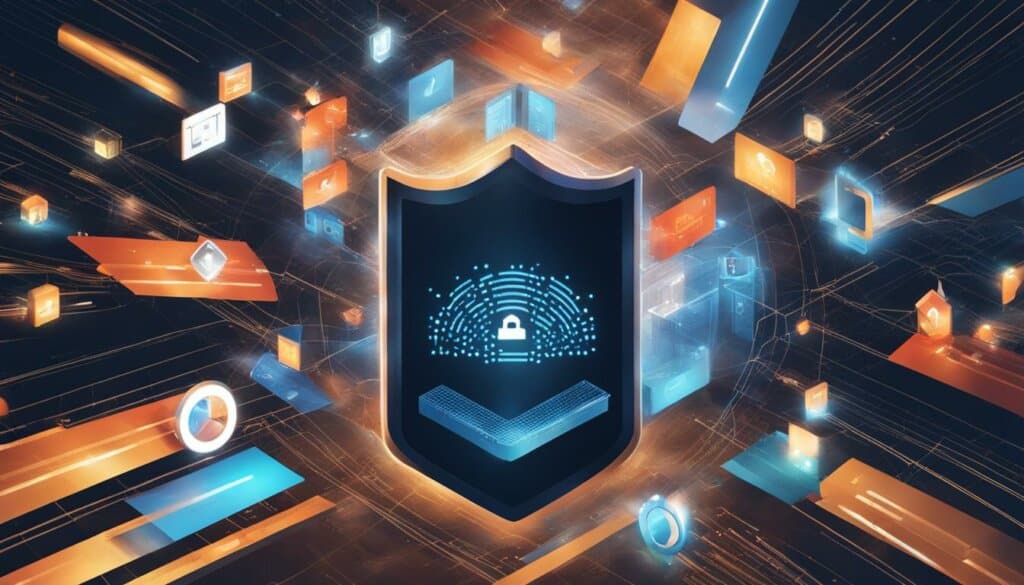Table of Contents
In the digital era, the sharing economy has revolutionised the way we live, work, and connect with others. From ride-sharing to home-sharing platforms, this collaborative approach offers convenience, affordability, and a sense of community. However, amidst the countless benefits, cybersecurity remains a critical concern.
Cyber threats lurk in the shadows, presenting risks to the security and privacy of community-based data. As more individuals and businesses participate in the sharing economy, safeguarding sensitive information becomes paramount. With network protection as the shield against malicious actors, preserving data security has become an imperative task.
To address the challenges posed by cyber threats, it is crucial to explore innovative ways to enhance cybersecurity in the sharing economy. From artificial intelligence to machine learning and privacy-enhancing technologies, emerging solutions hold the key to securing community-based data.
In this article, we will delve into the intricate world of cybersecurity in the sharing economy. We will examine the importance of protecting community-based data, the role of cyber information sharing in building collective resilience, and strategies to overcome barriers that hinder effective data sharing.
Join us on this journey to discover how the sharing economy can thrive in a secure and resilient digital landscape.
The Importance of Cybersecurity in Community-Based Data
Cybersecurity is of paramount importance in the sharing economy, especially when it comes to protecting community-based data. In an interconnected ecosystem like this, where users rely on sharing their data with others, it becomes crucial to have effective measures in place to prevent data breaches and maintain online safety.
To ensure the security of community-based data, it is essential to strengthen network protection and implement robust data encryption. These strategies help safeguard information from unauthorized access and maintain user privacy. By prioritizing cybersecurity, the sharing economy can build trust among its participants, enabling the ecosystem to thrive.
“In the sharing economy, cybersecurity is not just a matter of protecting individual users; it is about safeguarding the entire community.”
In addition to network protection and encryption, regular audits and comprehensive data breach prevention measures are crucial. This includes monitoring data access and usage, implementing strong authentication protocols, and staying updated with the latest cybersecurity practices and technologies.
By prioritizing cybersecurity and adopting proactive measures, the sharing economy can create a safe and secure environment for users, fostering trust and confidence in the community-based data ecosystem. It is imperative for businesses and individuals alike to stay vigilant and take proactive steps to prevent data breaches and protect the privacy of community-based data.
The Importance of Network Protection and Data Encryption
| Importance | Network Protection | Data Encryption |
|---|---|---|
| Prevents unauthorized access | Protects data from cyber threats | Secures data transmission and storage |
| Maintains user privacy | Deters malicious activities | Safeguards sensitive information |
| Builds trust in the sharing economy | Enhances network security | Mitigates the risk of data breaches |
Building Collective Resilience through Cyber Information Sharing
Cybersecurity is a critical aspect of protecting community-based data in the sharing economy. To ensure the safety and security of this data, collective resilience must be built through effective cyber information sharing.
Cyber information sharing serves as a platform for the cybersecurity community to come together and combat threats collectively. It recognizes that no single stakeholder can address all cyber threats alone. By sharing trusted and secure information, enterprises can enhance their resilience, detect and deter threat actors, and ultimately build trust.
However, building collective resilience through cyber information sharing comes with its own set of challenges. Barriers such as jurisdictional collaboration, cross-sector collaboration, skill gaps, and privacy concerns need to be overcome to promote collective resilience effectively.

Overcoming Barriers to Effective Cyber Information Sharing
The sharing of cyber information is crucial for building collective resilience in the cybersecurity community. However, several barriers hinder the effective sharing of such information, including gaps in jurisdictional collaboration, limited cross-sector cooperation, and concerns over privacy and trust. Overcoming these barriers is essential in order to enhance cybersecurity in the sharing economy and promote a safer digital environment.
Jurisdictional Collaboration
Gaining cooperation and collaboration across different jurisdictions remains a challenge in the realm of cyber information sharing. The global nature of cyber threats requires multinational efforts to combat them effectively. However, the complexities of legal frameworks and varying regulatory environments often hinder the timely and efficient sharing of critical information. Establishing harmonized policies and streamlined processes for cross-border collaboration is crucial in overcoming this barrier.
Privacy Concerns
Privacy concerns are another significant barrier to cyber information sharing. Individuals and organizations may hesitate to share sensitive data due to fears of potential privacy breaches or unauthorized access. Addressing these concerns requires the implementation of privacy-enhancing technologies that can safeguard personal information while still enabling effective information sharing. Striking the right balance between privacy and security is essential for building trust among stakeholders and fostering an environment conducive to collaboration.
| Barriers | Solutions |
|---|---|
| Jurisdictional Collaboration | Establish harmonized policies for cross-border cooperation |
| Privacy Concerns | Implement privacy-enhancing technologies |
“Overcoming these barriers is essential in order to enhance cybersecurity in the sharing economy and promote a safer digital environment.”
By addressing the barriers of jurisdictional collaboration and privacy concerns, the sharing of cyber information can be significantly improved. Collaboration between governments, regulatory bodies, and private sector entities is crucial for establishing consistent frameworks that facilitate effective information sharing. Additionally, the development and adoption of privacy-enhancing technologies provide a means to protect sensitive data while still enabling the exchange of critical information.
The future of cyber information sharing in the sharing economy depends on efforts to overcome these barriers. By fostering collaboration, implementing privacy-enhancing technologies, and building trust among stakeholders, the sharing economy can thrive in a secure and resilient manner.
Protecting Community-Based Data: The Role of Privacy Enhancing Technologies
In the sharing economy, where community-based data is an integral part of the ecosystem, privacy enhancing technologies (PET) play a crucial role in ensuring data privacy and cybersecurity. By implementing PET, organizations and individuals can share information while safeguarding the privacy and security of their data.
Differential privacy is one example of a PET that enhances data privacy in the sharing economy. It adds a layer of protection by injecting statistical noise into data sets, making it difficult for attackers to identify individual user information. This technique allows for the sharing of aggregated and anonymized data without compromising the privacy of individual users.
“Privacy enhancing technologies enable the sharing of information while preserving privacy and security.”
Encrypted computation is another PET that enhances online security in the sharing economy. It enables secure data processing by performing computations on encrypted data without revealing the underlying information. This technique ensures that sensitive data remains protected, even during data analysis or computation processes.
By implementing these privacy enhancing technologies, organizations and individuals can address the concerns and barriers related to trust and privacy in the sharing economy. These technologies provide a framework for secure and privacy-preserving data sharing, fostering a more resilient and secure ecosystem for community-based data.
| PET | Key Benefits |
|---|---|
| Differential Privacy | – Protects individual user information – Enables sharing of aggregated and anonymized data |
| Encrypted Computation | – Ensures secure data processing – Protects sensitive data during analysis or computation |
The Importance of PET in the Sharing Economy
Privacy enhancing technologies are essential in the sharing economy to maintain data privacy, protect against cyber threats, and build trust among users. By adopting differential privacy and encrypted computation, organizations can strike a balance between sharing data and preserving individual privacy, ensuring a secure and resilient sharing economy ecosystem.
Case Study: Using Privacy Enhancing Technologies for Collective Action
Privacy enhancing technologies (PET) have emerged as powerful tools in the fight against cybercrime and the protection of community-based data in the sharing economy. A recent case study showcased the potential of PET in driving collective action and collaboration within the cybersecurity community. By leveraging PET, secure and confidential querying was achieved, leading to effective results in addressing cyber threats and enhancing overall cybersecurity.
The case study demonstrated the importance of PET in enabling the sharing of information while preserving privacy and security. Through the use of differential privacy and encrypted computation, sensitive user data was protected and secure data analysis was conducted, without compromising individual privacy rights. This successful implementation of PET highlights its ability to promote collective action and foster collaboration among stakeholders in the sharing economy.
“Privacy enhancing technologies play a crucial role in enabling collective resilience in the face of evolving cyber threats. They not only protect user data but also facilitate secure information sharing, which is vital for detecting and deterring threat actors. By using PET, we can build trust and strengthen cybersecurity in the sharing economy ecosystem.”
The case study serves as a testament to the effectiveness of PET in overcoming barriers and promoting collective action in the cybersecurity landscape. As the sharing economy continues to grow, it is imperative that stakeholders adopt and implement PET to safeguard community-based data and enhance overall cybersecurity measures.
| PET Benefits | PET Use Cases |
|---|---|
|
|

Takeaways
- Privacy enhancing technologies (PET) are crucial in protecting community-based data in the sharing economy.
- Cases studies demonstrate the effectiveness of PET in driving collective action and collaboration in the cybersecurity community.
- Implementing PET enables secure information sharing while preserving privacy and security.
- PET benefits include preserving privacy rights, enhancing data security, and enabling confidential querying.
- Use cases for PET include differential privacy for data analysis and encrypted computation for secure data sharing.
Strengthening Data Governance in the Sharing Economy
Strong data governance is crucial in ensuring cybersecurity in the sharing economy. With the increasing reliance on technology and digital platforms, it is essential to have clear policies and regulations in place to protect user information and prevent data breaches. Effective data governance frameworks provide a structured approach to managing and protecting data, ensuring its integrity and security.
A key aspect of data governance is the implementation of comprehensive data breach prevention measures. Regular audits and vulnerability assessments help identify and address any security gaps, ensuring that the sharing economy platforms are secure and resilient against cyber threats. Encryption technologies play a vital role in safeguarding sensitive information, protecting it from unauthorized access or breaches.
| Data Governance in the Sharing Economy | Benefits |
|---|---|
| Clear policies and regulations | Ensures compliance and accountability |
| Effective data governance frameworks | Provides a structured approach to managing and protecting data |
| Regular audits and vulnerability assessments | Identifies and addresses security gaps |
| Encryption technologies | Safeguards sensitive information |
By implementing robust data governance practices, sharing economy platforms can instill confidence among users, fostering trust and promoting the growth of the ecosystem. When users have assurance that their data is protected, they are more likely to engage and participate in the sharing economy.

The Role of Regulations
Regulations play a critical role in data governance in the sharing economy. Strong and clear regulations ensure that platforms prioritize user data protection and cybersecurity. Compliance with these regulations helps maintain the integrity of the sharing economy ecosystem, safeguarding user information and preventing potential data breaches.
“”Data governance is not only about protecting user data but also ensuring that platforms comply with privacy and cybersecurity regulations.””
Regulatory bodies and industry standards help establish best practices for data governance, providing guidelines and frameworks for platforms to follow. These regulations also encourage transparency and accountability, enabling users to make informed decisions about sharing their data with the platforms.
Collaboration and Accountability
Effective data governance in the sharing economy requires collaboration between platform providers, users, and regulatory bodies. It is essential for platforms to actively involve users in the data governance process, seeking their feedback and addressing their concerns. This collaborative approach helps build trust and ensures that data governance practices align with user expectations.
Furthermore, accountability is vital in data governance. Platforms need to be transparent about their data handling practices and be accountable for any breaches or incidents. Regular reporting and audits help instill confidence among users and demonstrate a commitment to data protection.
Trust and Security in the Sharing Economy
Trust and security are fundamental to maintaining a thriving sharing economy. Users rely on the safety and security of their data to actively participate in this ecosystem. Establishing trust among users is crucial, and platforms must implement robust security measures to ensure a secure environment for all participants.
Identity verification plays a key role in building trust in the sharing economy. By verifying user identities, platforms can enhance security and create a sense of reliability. Strong onboarding processes that include thorough background checks and verification of personal information help weed out potential malicious actors and maintain a safe community.
“Trust is the foundation of any successful sharing economy. Users need to feel confident that their personal information and transactions are secure, and platforms have a responsibility to deliver on this promise.”
Creating a secure sharing economy also requires the implementation of robust data protection measures. Platforms must prioritize the security of user data by employing encryption techniques and ensuring secure data storage. Regular security audits can help identify and address vulnerabilities, ensuring a proactive approach to protecting the community’s data.
Table: Trust and Security Measures in the Sharing Economy
| Trust and Security Measures | Description |
|---|---|
| Identity Verification | Ensuring the authenticity of user identities through thorough checks and verification processes. |
| Strong Onboarding Processes | Implementing comprehensive procedures to screen potential users and mitigate risks. |
| Data Encryption | Protecting user data by using encryption techniques to ensure secure storage and transmission. |
| Regular Security Audits | Conducting frequent audits to identify and address vulnerabilities in the platform’s security infrastructure. |
By prioritizing trust and security, platforms in the sharing economy can foster a safe and reliable environment for users. Implementing identity verification, strong onboarding processes, and robust data protection measures are essential steps in ensuring the continued success of the sharing economy.

The Future of Cybersecurity in Community-Based Data
The future of cybersecurity in community-based data will see continuous advancements in technology and data protection, ensuring the security of shared information in the sharing economy. Artificial intelligence and machine learning will play an increasingly important role in detecting and mitigating cyber threats, providing enhanced security measures to combat evolving risks. These technologies enable the sharing economy to stay one step ahead of malicious actors, safeguarding the community-based data from potential breaches.
Integration of privacy-enhancing technologies (PET) and encryption methods will further strengthen data security in the sharing economy. Privacy-enhancing technologies protect user privacy while still allowing the necessary sharing of information, fostering trust among users. Differential privacy and encrypted computation are two examples of PET that protect data privacy and enhance cybersecurity. By implementing these technologies, the sharing economy can address concerns and barriers related to trust and privacy, providing a secure and reliable ecosystem for users.
Efforts to address emerging threats and implement robust security measures will be essential in maintaining the integrity and security of community-based data. Ongoing developments in technology and data protection will ensure that the sharing economy remains adaptable and resilient in the face of cyber threats. By continuously enhancing cybersecurity measures and fostering a culture of data security, the sharing economy can thrive and grow sustainably, providing users with a trusted and secure environment for their community-based data.
Potential Future Trends in Cybersecurity
- Increased use of artificial intelligence and machine learning to detect and mitigate cyber threats.
- Integration of blockchain technology to enhance data security, transparency, and accountability in the sharing economy.
- Growth in the adoption of IoT security measures to protect devices and networks from cyber attacks.
- Rise in the use of biometric authentication systems for enhanced user data protection.
- Advancements in quantum-resistant cryptography to ensure the long-term security of shared data.
With the evolving landscape of cyber threats, it is imperative for the sharing economy to embrace these future trends to protect community-based data. By staying ahead of cybercriminals and adopting innovative cybersecurity measures, the sharing economy can continue to thrive and provide users with a secure and trusted platform for sharing and collaboration.
| Current Cybersecurity Measures | Potential Future Enhancements | |
|---|---|---|
| Network Protection | Firewalls, intrusion detection systems | AI-powered threat detection, behavior analysis |
| Data Encryption | SSL/TLS encryption, data-at-rest encryption | Homomorphic encryption, quantum-safe encryption |
| Privacy Enhancing Technologies | Differential privacy, encrypted computation | Secure multiparty computation, zero-knowledge proofs |
Conclusion
Cybersecurity is essential in safeguarding community-based data in the sharing economy. In this interconnected ecosystem, effective measures are necessary to protect user information and maintain online safety.
Cyber information sharing, privacy enhancing technologies, and strong data governance play vital roles in building collective resilience and securing user data. By collaborating and sharing valuable information, enterprises can enhance their ability to detect and deter cyber threats. Implementing privacy enhancing technologies, such as differential privacy and encrypted computation, helps protect data privacy and enhance cybersecurity in the sharing economy.
Trust and security are foundational elements of the sharing economy. Establishing trust among users is crucial, and this can be achieved through robust identity verification and secure onboarding processes. By implementing secure platforms and comprehensive data protection measures, the sharing economy can create a trustworthy and secure environment.
As technology continues to advance, ongoing efforts must be made to address emerging threats and implement robust security measures. Artificial intelligence and machine learning will play an increasingly important role in detecting and mitigating cyber threats. The integration of privacy enhancing technologies and encryption methods will further strengthen data security in the sharing economy. By maintaining a focus on cybersecurity, the sharing economy can continue to thrive and evolve while protecting the integrity and security of community-based data.
FAQ
What is the sharing economy?
The sharing economy refers to a business model where individuals can share goods, services, or resources with others through online platforms.
Why is cybersecurity important in the sharing economy?
Cybersecurity is crucial in the sharing economy to prevent data breaches, protect user privacy, and maintain trust among participants.
What are some strategies to ensure cybersecurity in the sharing economy?
Strengthening network protection, implementing data encryption, and using privacy-enhancing technologies are key strategies to ensure cybersecurity in the sharing economy.
How does cyber information sharing contribute to collective resilience?
Cyber information sharing enables enterprises to enhance their resilience, detect and deter threats, and build trust by sharing valuable insights and experiences within the cybersecurity community.
What barriers hinder effective cyber information sharing?
Barriers such as jurisdictional collaboration, cross-sector collaboration, skill gaps, and privacy concerns can hinder effective cyber information sharing.
What are privacy enhancing technologies (PET) and how do they enhance cybersecurity?
Privacy enhancing technologies enable the sharing of information while preserving privacy and security. Tools like differential privacy and encrypted computation protect data privacy and enhance cybersecurity in the sharing economy.
Can you provide an example of the effectiveness of privacy enhancing technologies?
A case study demonstrated that the use of privacy enhancing technologies enabled secure and confidential querying, leading to effective results in addressing cyber threats and promoting collective action within the cybersecurity community.
How does strong data governance contribute to cybersecurity in the sharing economy?
Clear policies, regulations, and effective data governance frameworks help prevent data breaches and protect user information, ensuring the integrity and security of community-based data in the sharing economy.
Why is trust and security important in the sharing economy?
Trust and security are foundational elements of the sharing economy. Users must have confidence in the safety and security of their data to participate in the sharing economy and establish trust among fellow users.
What does the future of cybersecurity in community-based data look like?
The future will see continued advancements in technology and data protection, with artificial intelligence, machine learning, privacy enhancing technologies, and encryption methods playing an increasingly important role in detecting and mitigating cyber threats in the sharing economy.
Source Links
- https://www3.weforum.org/docs/WEF_Cyber_Information_Sharing_2020.pdf
- https://www.oecd-ilibrary.org/sites/15c62f9c-en/index.html?itemId=/content/component/15c62f9c-en
- https://fully-verified.com/identity-verification-in-the-sharing-economy/













